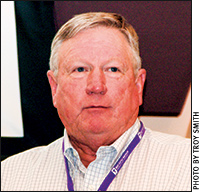ISBCW 2016:
Hire the Right Driver
by Troy Smith, field editor
MANHATTAN, Kan. (June 9, 2016) — For truck drivers charged with the transport of livestock, Ron Gill thinks driver training has been woefully inadequate. Speaking at the International Symposium on Beef Cattle Welfare, hosted June 8-10 in Manhattan, Kan., the Texas A&M Extension Livestock Specialist said it is not because driver training is unavailable. It’s because too few people take advantage of it.

“We need to place more emphasis on transportation training, said Ron Gill, Texas A&M Extension livestock specialist, adding that most drivers will be receptive.
“There is the [Beef Quality Assurance] Master Transporter Program, plus other transportation training and educational material that is available,” said Gill, explaining how drivers can obtain training in the areas of biosecurity, animal handling, loading and unloading, weather-related issues, and truck and trailer maintenance.
Gill emphasized that drivers trained in the proper handling and transport of cattle can help reduce stress and sickness in cattle, prevent bruises, and improve the quality of the meat from these animals. By using best practices, transporters can help the beef industry save millions of dollars annually, as well as enhance animal welfare. He referred the audience to the Beef Cattle Institute’s Animal Care Training (ACT) website for more information about available online training programs focused on transportation and other areas of quality assurance management.
Gill also referenced the Canadian Livestock Transport (CLT) Certification Program, a beef industry-driven initiative that began in Alberta, spread to other provinces and evolved into a national program. CLT participants also learn emergency response procedures and are educated regarding Canadian regulations pertaining to livestock transportation. CLT Verified is an online tool through which anyone can verify whether a driver is certified. Increasingly, Canadian meat processors have required that drivers delivering livestock to their facilities be certified. Many trucking companies have made certification mandatory for their employees.
“It’s something we need to look at in the U.S.,” opined Gill. “We need to place more emphasis on transportation training, and most drivers will be receptive. We probably need mandatory certification.”
Watch for additional coverage of the 2016 ISBCW on www.angus.media and in the Angus Journal and Angus Beef Bulletin. Comprehensive meeting coverage will be archived at www.api-virtuallibrary.com/meetings_other_news.html.
Editor’s Note: The articles used within this site represent a mixture of copyrights. If you would like to reprint or repost an article, you must first request permission of Angus Media by contacting the editor at 816-383-5200; 3201 Frederick Ave., Saint Joseph, MO 64506. Angus Media claims copyright to this we site as presented. We welcome educational venues and cattlemen to link to this site as a service to their audience.
